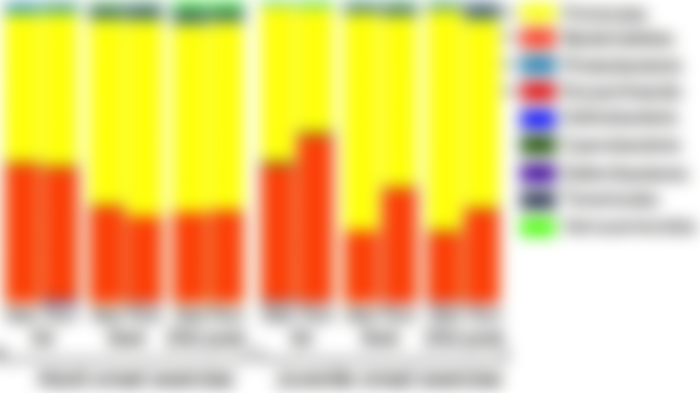
A poorly balanced diet can be a source of various problems, and all health authorities agree on the fact that a healthy diet should be preferred to maintain good physical condition. However, beyond cardiovascular disease and other disorders that can be caused, the long-term consequences of such a diet started in childhood are far from negligible. A team has indeed shown, on mice, that the consumption of unhealthy food during childhood, coupled with lack of exercise, could permanently affect the microbiota.
The study, conducted by researchers at UC Riverside, is one of the first to show a significant decrease in the total amount and diversity of gut bacteria in mature mice fed an unbalanced diet when eating. childhood. " We studied mice, but the effect we observed is equivalent to the fact that children eat a Western diet, which is high in fat and sugar and that their gut microbiota is still i up to six years after puberty ", explains physiologist Theodore Garland.
The microbiota refers to all the bacteria, micro-fungi, protists, which live on and inside a human or animal. Most of these microorganisms are found in the intestines, and the majority of them are useful, boosting the immune system, breaking down food, and helping to synthesize key vitamins.
In a healthy organism, there is a balance between pathogenic and beneficial organisms. However, if the balance is disturbed, whether through the use of antibiotics, illness, or an unhealthy diet, the body can become vulnerable to disease. In this study, Garland's team researched the impacts on the microbiota after dividing mice into four groups: half fed the standard, healthy diet, the other half the less healthy Western diet, half with access one wheel for exercise, and the other half without a wheel.
In this study, Garland's team researched the impacts on the microbiota after dividing mice into four groups: half fed the standard, healthy diet, the other half the less healthy Western diet, half with access one wheel for exercise, and the other half without a wheel.
Poorly balanced diet: it causes a decrease in the microbiota
After three weeks spent on these diets, all of the mice were returned to a standard, exercise-free diet, which is normally how mice are kept in a lab. At the end of the 14 weeks, the team examined the diversity and abundance of bacteria in the animals. They found that the amount of bacteria such as intestinal Muribaculum was significantly reduced in the western food group. This type of bacteria is involved in the metabolism of carbohydrates.

Effects of exercise in early life at the phylum level. The relative abundance of nine phyla for sedentary (sed) and athletic (run) adult and juvenile rats after three days (3d) and six weeks (6 wk) of exercise, and 25 days after stopping exercise (25 d post). Significant differences in phyla due to exercise were only observed in juveniles. Specifically, juvenile exercise increased the relative abundance of Euryarchaeota and Bacteroidetes and decreased the relative abundance of Firmicutes and proteobacteria, overall and at 6 weeks. © Monica P. McNamara et al. 2021
The analysis also showed that gut bacteria are sensitive to the amount of exercise mice do. Muribaculum bacteria increased in mice fed a standard diet that had access to a racing wheel and decreased in mice fed a high-fat diet whether or not they exercised.
The greater long-term impact of diet compared to exercise
Researchers believe that this species of bacteria and the family of bacteria to which it belongs could influence the amount of energy available to its host. Research is continuing on other functions that this type of bacteria can have. Another effect of note was the increase in very similar bacteria species that were enriched after five weeks of treadmill training in a study by other researchers, suggesting that exercise alone may increase its presence.

